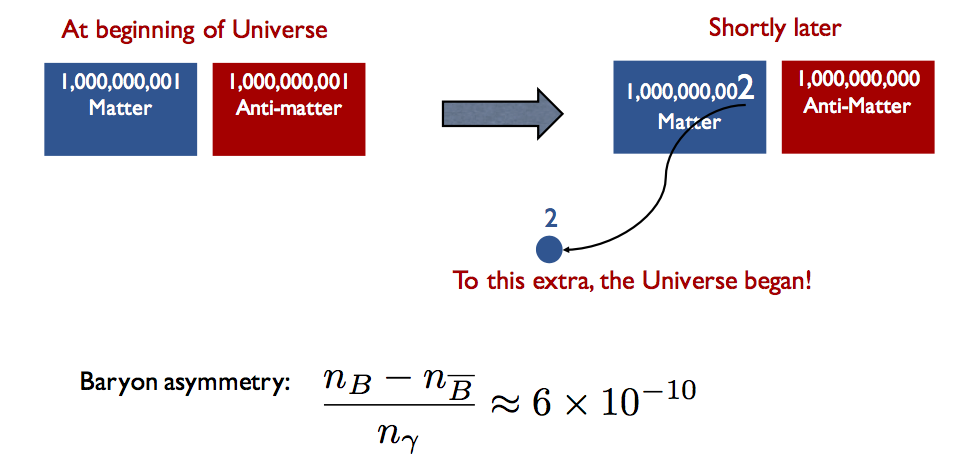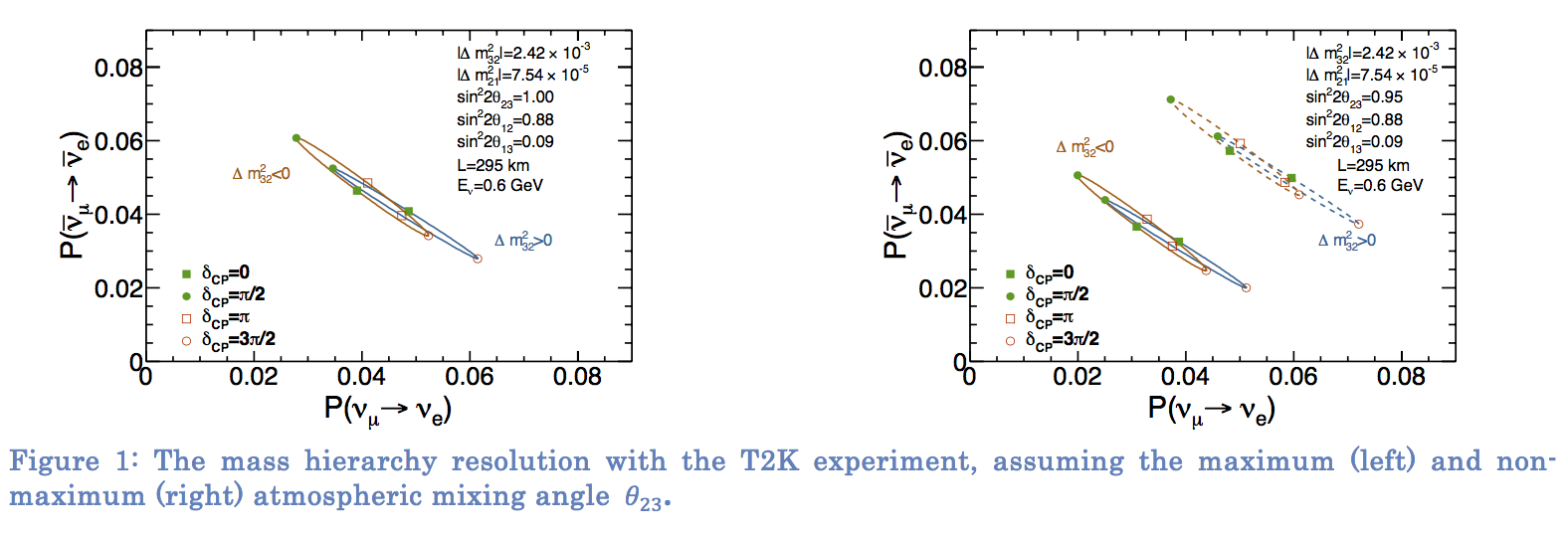CP violation search
In 2013, with just 8.4% of the currently approved exposure, νμ → νe appearance was discovered by T2K [1]. Along with the νe disappearance at reactor experiments, this observation confirmed the non-zero θ13 and thus opened the door to explore CP violation effect, which arises from an irreducible phase δCP in the standard mixing matrix. T2K & NOvA, two largest long-baseline neutrino experiments in the world, started to search for this effect. Hyper-K & DUNE, the next generation of long-baseline neutrino experiments also put this search as the main target.
Why is CP violation in neutrino BIG thing?
Neutrino can be our mother [Hitoshi Murayama]!. An ultimate question to the physics is how the life begins or how the Universe exists. It is popularly believed that matter and anti-matter are equal at the beginning of Universe. However this balance must be changed shortly after in order to leaving a matter-dominated Universe as we observe today. How can that change happen?

Credit: S. Cao, at VJSE 2016
In 1967, Andrei Sakharov listed three conditions needed for the matter excess of the Universe, or so-called baryon asymmetry: i) Baryon-number-violating process must be exited, ii) the Nature laws treat matter and anti-matter differently and iii) the baryon-number-violating process must be out of thermal equilibrium.
The naturalness of tiny neutrino mass can be explained via a mechanism, called See-saw mechanism in which heavy right-handed neutrinos are presumably existed, but not observed yet. Leptogenesis, which treat leptons differently from anti-leptons is a natural consequence of See-saw mechanism and can be recognized via the difference in the behaviors of neutrinos and antineutrinos. This is now worldwide goal of high energy physics. Leptogenesis can partly convert to baryogenesis and provides an appealing hypothesis to explain matter-dominant Universe.
How to search CP violation with neutrino oscillations?
Under the charge-parity (CP) symmetry, we expect following relationship between the oscillation probability between neutrinos and anti-neutrinos (read Neutrino Oscillation first).

where Vmat is the effective potential caused by the effect of matter in which neutrinos pass through. Even in a vacuum (i.e., V ≡ 0), the neutrino oscillation probability and its CP process, in general, are not the same if δCP≠0

Credit: S. Cao for JSPS application.
The CP violation effect in neutrino can be measured by comparing the νμ → νe and ν ̄μ → ν ̄e oscillation probabilities or by comparing these oscillations with ν ̄e disappearance measured by reactors.
T2K performed a joint analysis of the νμ → νe appearance and the νμ disappearance and provided the first hint at maximum CP violation with δCP ∼ −pi/2 and normal mass hierarchy [2]. If this scenario is assumed, T2K with the fully approved 7.8 × 1021 POT exposure, predictedly finishing data taking by 2020, would observe the CP violation with 90% C. L. [3]. By that time, the Main Ring (MR) beam power is predicted to be ∼ 750 MW by reducing the repetition cycle from 2.48 s to 1.3 s. To prepare for the next generation of the long baseline ν experiments at J-PARC, T2HK (Tokai to Hyper-Kamiokande) [4], the MR beam power is planned to upgrade up to 1.3 MW by further reducing the repetition cycle and in- creasing the intensity of proton per pulse. T2K-II, which is proposed to extend the data-taking until 2026, would get benefit from this upgrade and anticipatedly accumulate 20 × 1021 POT in total.
(Credit: S. Cao proceeding at ICHEP 2016)
[1] Abe, K. et al, Phys. Rev. Lett. 112, 061802 (2014)
[2] Abe, K. et al, Phys. Rev. D 91, 072010 (2015)
[3] Abe, K. et al, PTEP 4, 043C01 (2015)
[4] Abe, K. et al, PTEP , 053C02 (2015)
Go to >>>Neutrino Detection